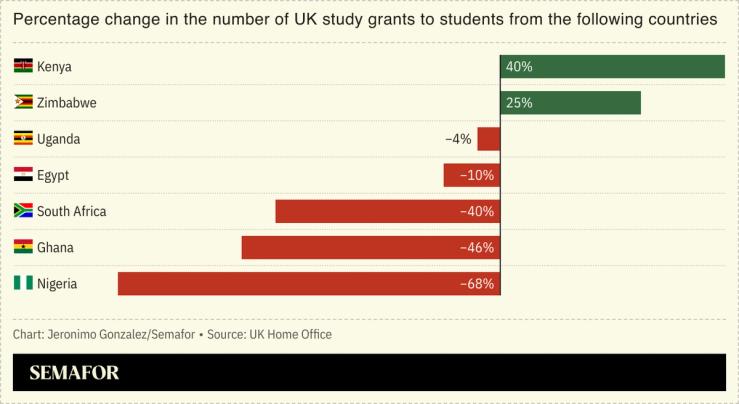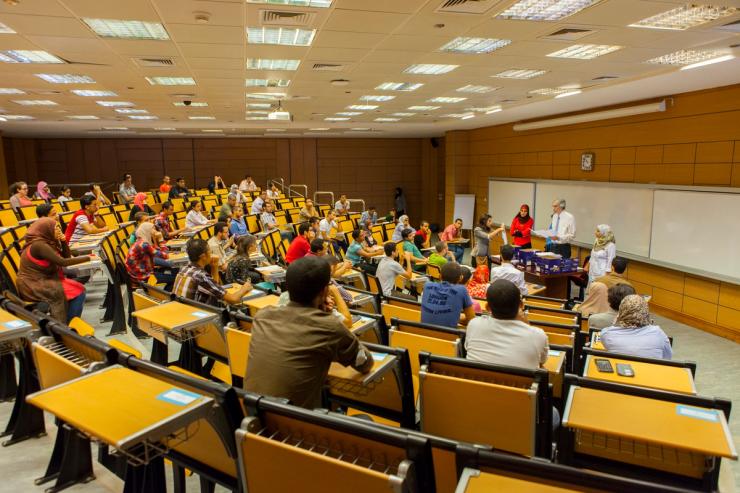The News
The number of Nigerian students moving to the UK has more than halved following British policy shifts aimed at curbing migration.
Under a rule change that came into force in January, foreign postgraduate students are no longer allowed to bring family members to Britain. People from Nigeria make up one of the UK’s biggest groups of foreign students and in recent years brought more dependents — typically children and partners — than those from any other country.
Home Office figures show the number of “main applicant” student visas granted to Nigerians in the first six months of 2024 was 4,669, compared with 14,772 in the corresponding period last year — a 68% drop. The fall in Nigerian student visas granted — 10,103 — accounted for 43% of the overall 23,565 fall in overseas student visas.
Overall, the number of students arriving from African countries fell. In the few cases where the number of student visas granted rose, the increases were small. The number of Kenyan students moving to the UK rose from just 351 to 491.
The shift reflects the success of UK policies aimed at cutting immigration. Skilled Nigerians are increasingly choosing US and Canadian universities, causing a drop that has deepened a funding crisis in British universities.
It’s part of a broader drop in non-EU overseas students moving to the UK that has prompted panic in British universities, which rely on tuition fees from that group for nearly 20% of their total income. Many universities now fear funding shortfalls amid concerns that international students will not return.
The Office for Students (OfS), the independent regulator of higher education in England, said in a report published in May that funding drying up could threaten the existence of some universities.
It warned that “there are risks” associated with relying on growth in international student numbers to underpin financial sustainability. “If providers are not able to evolve and adapt successfully to the changing financial landscape, there is a significant risk that some will become unsustainable,” it said, adding: “This could lead to individual providers leaving the higher education market.”

Know More
Dwindling job opportunities, high inflation, and rising insecurity has sparked an exodus of young Nigerians in recent years known locally as “Japa”. It’s a slang term meaning “flee” or “escape” in the Yoruba language widely spoken in southwest Nigeria.
Britain has traditionally been the preferred destination for many Nigerian students, in part due to the lack of a language barrier, being in similar time zones, and the short flight between the two countries. But the US and Canada have grown in popularity in the last few years.
The number of Nigerian students in Canada rose by 45,965 from 2022 to 2023 — a 113% increase — according to the Canadian Bureau for international Education, a non-profit organization whose members include more than 100 higher education institutions.
A separate study, published by Canadian technology company ApplyBoard last November, found that Nigerians were Canada’s fastest growing group of international students in the first half of 2023.
Canada has sought to increase its number of international students as part of a broader effort in recent years to increase immigration to counter its low birth rates and stimulate economic growth.
One student, 22-year-old David Omoyajowo, said the ease of securing citizenship in Canada made it a more attractive option.
“I don’t like going where I am not wanted,” he said in an interview in Lagos. “Every two years there’s always some issue about immigration or fears of people stealing their jobs.”
Alexis’s view
Nigerian students are clearly staying away from Britain — and the shift has been swift. One key factor is the collapse of the naira currency since the decision in May 2023 to allow it to float. That has pushed up the cost of moving abroad, making it unaffordable for many.
But the policy change preventing postgraduate students from bringing their families made the UK particularly unattractive for Nigerians who could afford to study abroad. I predicted this impact when the restrictions were first announced by Britain’s then Conservative government in May last year, more than half a year before they came into effect.
Much like Brexit, the funding catastrophe faced by British universities can be traced to attempts to address a deep rooted concern about migrant numbers. And the result is proving to be equally disastrous.
Leaving the European Union torpedoed Britain’s economy and, in this case, the country’s higher education institutions are reckoning with their heavy reliance on non-EU international students — and, specifically, those from Nigeria.
The increased public hostility towards migrants in Britain will only make the country seem less appealing. Images of white supremacists who rioted in British cities earlier this month traveled around the world. It’s easy to see why, given the chance, Nigerians will want to move to more welcoming countries like Canada.
The View From Rome
“The numbers of African students studying in Italy should be increased,” Italian foreign minister, Antonio Tajani, said last week.
Italy’s national statistics agency estimates that the country issued about 25,000 study permits in 2022, compared to almost 105,000 issued by France and about 70,000 by Germany. It cited the limited use of Italian as a foreign language as one of the likely reasons for the country’s lack of popularity compared to other European countries.
Room for Disagreement
Bank Chiugo Anagbogu, a student at the University of Lagos who hopes to begin studying in the UK early next year, said she is undeterred by the policy changes over the past year to limit migration.
“Maybe my perspective would be different if I had a family that I wanted to take there. But they’re protecting their economy and that’s quite okay,” she told Semafor Africa.
— Additional reporting by Alexander Onukwue in Lagos
Notable
- Russian President Vladimir Putin last year said the number of Africans benefiting from scholarships to study in Russian universities had grown 150% in the past three years and “will exceed 4,700 students” in the 2024 academic year.


